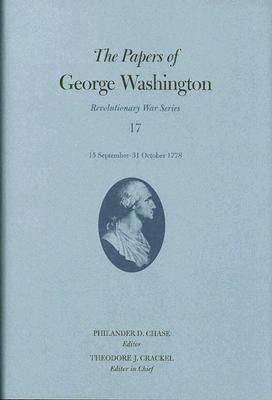- Bible
- Read the Bible
- Bible Versions
- Verse of the Day
- Reading Plans
- Verses by Topic
- Books of the Bible
- Bible Images
- Study
- Commentaries
- Concordances
- Dictionaries
- Encyclopedias
- Sermons
- Bible Atlas & Maps
- BP Wiki
- Devotionals
- Today's Devotionals
- Light of the World
- All Devotionals
- Inspirational Quotes
- More
- Picture Quotes
- Videos
- Inspirational
- Bible Study
- What The Bible Says
- Bible Q&As
- Daily Bread
- Bible by Genre
- Bible Stories
- Random Bible Verse
- Community
- Store
The Papers of George Washington, 17: 15 September-31 October 1778
by George Washington
Volume 17 of the Revolutionary War Series opens with Washington moving his army north from White Plains, New York, into new positions that ran from West Point to Danbury, Connecticut. His purpose in doing so was threefold: to protect his army, to protect the strategically important Hudson highlands, and to shore up the equally vital French fleet anchored at Boston. His new headquarters, located near Fredericksburg, New York, about seventy miles north of New York City, was one of the most obscure of the Revolutionary War. Nevertheless, Washington remained as busy with important tasks during the fall of 1778 as during any other period of the war. It was a time of delicate transition for the new Franco-American alliance and for British strategists yet unwilling to concede defeat. Both circumstances required Washington to exercise the sort of mental agility he had demonstrated during the first three years of the war. Equally pressing were the immediate problems of British raids--threatened and real--in New Jersey and New York and along the extensive American frontier and coastline. Within the Continental army, troubling breakdowns in discipline and morale demanded Washington's close attention, as did the logistical and political difficulties of planning proper troop dispositions for the coming winter--the fourth straight winter that Washington would not see home.
Although Washington could not foresee in October 1778 that the British would soon try their hand at conquering the southern states and that the war would last another five years, he sensed that the British Ministry still had both the financial means and the political will to continue the struggle. Ever a realist, Washington recognized that American victory would not come cheaply in what had become a war of attrition as well as an international conflict involving North American, European, and Caribbean theaters. As he had done since 1775, Washington was once more adjusting his thoughts to meet new realities on the long road to American independence.
Although Washington could not foresee in October 1778 that the British would soon try their hand at conquering the southern states and that the war would last another five years, he sensed that the British Ministry still had both the financial means and the political will to continue the struggle. Ever a realist, Washington recognized that American victory would not come cheaply in what had become a war of attrition as well as an international conflict involving North American, European, and Caribbean theaters. As he had done since 1775, Washington was once more adjusting his thoughts to meet new realities on the long road to American independence.
BUY NOW
Hardcover, 784 pages
Published February 15th 2008 by University of Virginia Press (first published December 10th 2007)
© 2025 Bibleportal.com All rights reserved.

George Washington was the commander of the Continental Army in the American Revolutionary War (1775-1783) and served as the first President of the United States of America (1789-1797). For his central role in the formation of the United States, he is often referred to as the father of his country.
Washington was baptized into the Church of England. In 1765, when the Church of England was still the state religion, he served on the vestry (lay council) for his local church. Throughout his life, he spoke of the value of righteousness, and of seeking and offering thanks for the "blessings of Heaven."
The Electoral College elected Washington unanimously in 1789, and again in the 1792 election; he remains the only president to receive 100% of the electoral votes.
Washington proved an able administrator. An excellent delegator and judge of talent and character, he held regular cabinet meetings to debate issues before making a final decision. In handling routine tasks, he was "systematic, orderly, energetic, solicitous of the opinion of others but decisive, intent upon general goals and the consistency of particular actions with them.
Washington died in 1799. He has been consistently ranked by scholars as one of the greatest U.S. Presidents.
... Show more